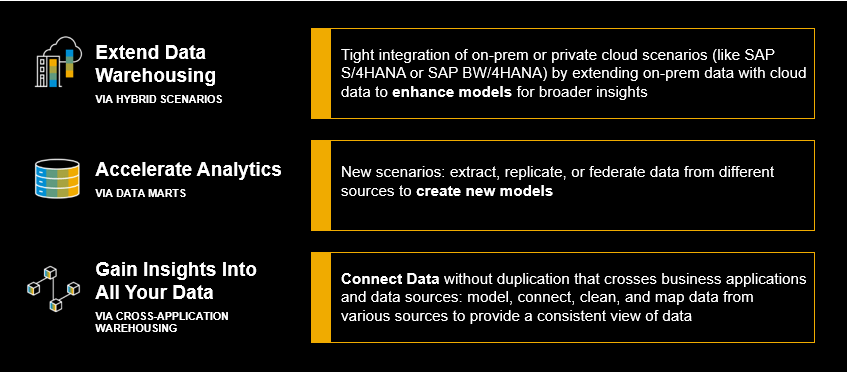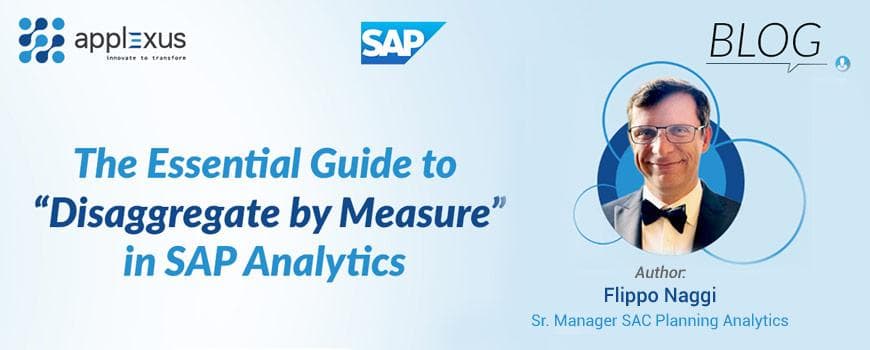Analytics Unchained! Turbocharge Your Business with Agile and Self-serve Analytics
24 February 2021


Buntic Georgian
Data Strategist & AdvisorBuntic Georgian is the Vice President of Analytics at Applexus. With over 22 years of SAP consulting experience primarily focused on SAP Business Analytics and Advanced...
The Pursuit to Solve the 'Data Quandary' is a Never-ending Struggle for Most Organizations
The data management space has made significant strides over the past decade. In hopes of driving competitive advantages through their data, organizations have invested heavily in modern data architectures including data lakes, data warehouses, and data marts. Additionally, organizations have deployed the latest BI and visualization tools and data science methodologies to gain more insights into their data. Yet, what Applexus has found, and industry analysts confirm, is that companies are still struggling to make productive use of their data. Our findings further indicate that, despite all their investments, organizations are not able to address some of the age-old barriers to leverage the full potential of their data. These barriers include limited data access, data quality issues, stale data, long implementation timelines, and high costs.
The Rapidly Evolving Competitive Environment Poses New Business Challenges, Driving the Need for Faster Decision Cycles
Shifting perspectives, organizations now must navigate a rapidly evolving marketplace coupled with a relentlessly competitive environment. Changing consumer preferences, new business models powered by technological advancements, and increased globalization are driving companies to compete more aggressively to sustain in the marketplace. Businesses are now faced with shorter decision cycles and, more than ever, need trusted insights into their data. They need immediate visibility to challenges, risks and need to see value sooner as opportunities arise. In short, organizations need the ability to move quickly when the wind changes direction.
While traditional BI solutions have varying degrees of success in delivering meaningful business reporting and analytics, organizations have struggled to deliver analytics at the speed of the business. Lack of self-service options for users to consume insights without IT dependency further limits the ability of the business to drive more insights from their data assets. Whether it is acquiring and transforming data or applying advanced analytics to gain insights from data, or visual interpretation of data, business is dependent on IT to deliver analytics initiatives.

As a response to these challenges, lines of business have built their own BI solutions and data marts by downloading data from enterprise BI applications and staging the data in business-owned data marts. The major downside to this approach is the uncontrolled proliferation of business-managed data silos. Organizations now have to deal with the increased complexity of analytics platforms and multiple versions of the truth. As a result, real-time and actionable insights remain elusive for most organizations.
A Paradigm Shift is Needed to Make the Leap to a More Productive Use of Data
Businesses need a data platform that can seamlessly connect to diverse data sources (enterprise and non-enterprise data, structured and non-structured data, big data, and dark data) and convert data into actionable insights. They need a BI platform that allows decisions to be made in real-time, not after the fact. They need capabilities that automate and streamline much of the manual work associated with gathering and preparing data for analytics. Furthermore, organizations need to empower more end-users with data access without a dependence on IT and data scientists. In short, they need to decrease time to insight to make smarter business decisions faster. Businesses need to do all of this without committing to large capital projects but rather, leverage the dynamic services that the cloud provides.
In response to the growing demand for simpler, faster, and self-service analytics, Data Warehouse-as-a-Service (DWaaS) on the cloud has recently emerged as an alternative to conventional, on-premise data warehousing solutions. DWaaS is a model in which a third-party vendor configures and manages the hardware and software resources required for a data warehouse. In turn, customers acquire and stage the data in the data warehouse and use various BI tools to drive insights and visualizations on the data. Customers typically pay for the managed data warehouse based on their usage and can scale up as needed with no upfront procurement or license costs.
In recognition of this, SAP has created SAP Data Warehouse Cloud (DWC) which brings the power and performance of SAP HANA to the cloud allowing organizations to manage their data storage and federation, run powerful analytical and intuitive visualizations, all within a single cloud-based DWaaS solution.
What is Unique about SAP Data Warehouse Cloud?
SAP Data Warehouse Cloud (DWC) is a cloud native DWaaS solution designed for both IT and line of business users. Built on SAP HANA Cloud, SAP DWC includes capabilities to acquire and manage data storage, federate data, and develop powerful analytical applications. Most importantly, it comes with built-in visualization from SAP Analytics Cloud that enables instant decision-making powered by visual artifacts. It is elastic so it can scale compute and storage resources up and down on-demand, and you only pay for what you use.
The unique feature of SAP DWC is in how business users are empowered to leverage enterprise and external data independently from IT but within a centrally governed environment.

To delve into some of the user-friendly features of SAP DWC:
- The graphically intuitive Data Builder functionality empowers business users to acquire, transform and enrich data from SAP and non-SAP data sources.
- Built-in SAP Analytics Cloud and Data Flow functionalities enable users to gain deeper and actionable insights into data by applying predictive algorithms and statistical modeling on data.
- Lastly, users can leverage the Story Builder functionality to discover data patterns and develop data visualizations to consume data in an intuitive and actionable format.
Business users can independently understand and connect data, transform it into insights, and share information instantly - without manual processes or data duplication. With the minimal dependency on IT, business users can gain the insights they need when they need it and make trusted decisions based on real-time information. This DWaaS solution also enables IT to govern data at the speed of business so that users can rely on these insights with no delays. In short, SAP DWC provides a unified data and analytics platform that can enable business self-service and agility.
Implementation Scenarios
SAP DWC addresses many business requirements due to the ease of use, rich feature set, and functionality. Here are some typical scenarios where SAP DWC is an ideal solution:
Extend Data Warehousing via Hybrid Scenarios
If you have already deployed on-prem SAP Data Warehousing solutions or are implementing other SAP solutions such as SAP S/4HANA, you can leverage SAP DWC to extend your existing data warehouse investments to the cloud and rapidly integrate SAP and non-SAP data to accelerate time to value for LOBs. You can connect / not collect data, whether data sources are on-prem or cloud, avoid unnecessary copies of data and empower business users and administrators to easily leverage SAP and non-SAP data sources.

*Source: SAP
Accelerate Analytics via Data Marts
In this scenario, you can leverage SAP DWC to empowers users to become self-sufficient through the agile and flexible deployment of new analytical scenarios. You can embrace all the business-owned silo data marts into an enterprise-grade data mart to establish a single source of the truth and provide your business users the ability to develop their data scenarios independently of IT. You can deliver enterprise-class data governance for trusted insights without data duplication.
Cross-Application Warehousing
SAP DWC can serve as a cross-application data warehouse that virtually combines diverse data sources to minimize data copies with centrally governed data access and enables collaboration among the different business groups. You can minimize data copies and inaccuracies through governed access to data and achieve a trusted single source of the truth across the enterprise.
Final Thoughts
SAP Data Warehouse Cloud is an end-to-end DWaaS solution that includes data warehousing and data visualization capabilities. With a rich set of features and capabilities geared towards both IT and LOB users, SAP DWC can solve your growing need for self-service insights and analytics.

Furthermore, SAP DWC works synergistically with existing on-premise systems and provides a simple and cost-efficient way to embrace cloud computing.
SAP DWC can help overcome the traditional challenges that organizations have faced with respect to limited data access, lengthy time to value, lack of real-time data, and high costs of entry. Most importantly, organizations can now deliver true self-service analytics to the business by empowering users to curate data and consume insights from the data on a single user-friendly platform.
What's Next?
In our upcoming analytics series we will discuss different use cases powered by SAP DWC and scrutinize the specific functionality of SAP DWC through additional blogs & videos. Some of our upcoming blogs include:
Blog 1: Implementing an Advanced Analytics Scenario on SAP Data Warehouse Cloud
Blog 2: Cross-Application are Warehousing on SAP DWC
Blog 3: Empowering Line of Business (LoB) Users with Spaces and Business Modeling on SAP Data Warehouse Cloud
Blog 4: Deeper Dive into Data Governance, Security, Data Wrangling, and Data management on SAP DWC
Please join our webinar on Wednesday, March 11 entitled ‘Drive Business Self-Service Analytics with SAP Data Warehouse Cloud’ to gain further insights on how you can leverage SAP Data Warehouse Cloud to empower your business to drive self-serve enterprise data analytics and deliver real-time insights with end-to-end functionality. This webinar will be case study-based wherein we will discuss various factors considered by two customers in deciding to deploy SAP DWC.












